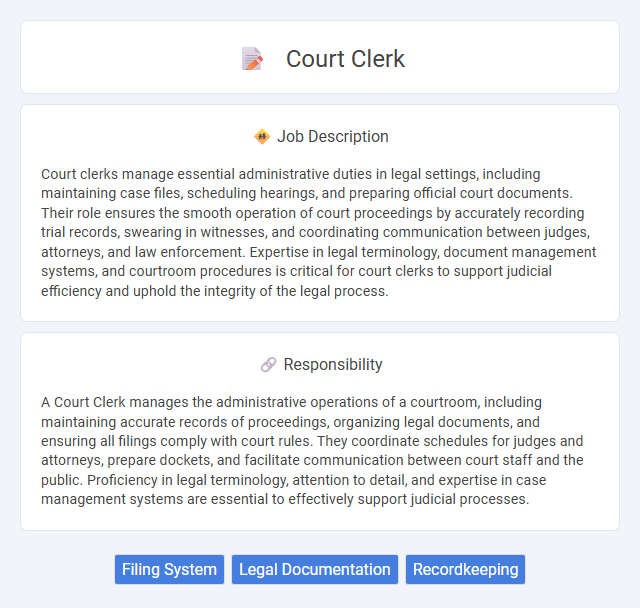
Court clerks manage essential administrative duties in legal settings, including maintaining case files, scheduling hearings, and preparing official court documents. Their role ensures the smooth operation of court proceedings by accurately recording trial records, swearing in witnesses, and coordinating communication between judges, attorneys, and law enforcement. Expertise in legal terminology, document management systems, and courtroom procedures is critical for court clerks to support judicial efficiency and uphold the integrity of the legal process.
Individuals with strong organizational skills and attention to detail are likely to thrive as court clerks, as the role requires managing records and supporting legal procedures accurately. Those who prefer structured environments and routine tasks may find this position suitable, while candidates who struggle with multitasking or work under pressure might face challenges. The probability of success increases for people with good communication skills and an interest in the legal system.
Qualification
Court Clerks must possess strong organizational skills, attention to detail, and proficiency in legal terminology and document management. A high school diploma or equivalent is typically required, while some positions may require postsecondary education or specialized training in court administration. Experience with courtroom technology and knowledge of procedural rules enhances qualification for this role.
Responsibility
A Court Clerk manages the administrative operations of a courtroom, including maintaining accurate records of proceedings, organizing legal documents, and ensuring all filings comply with court rules. They coordinate schedules for judges and attorneys, prepare dockets, and facilitate communication between court staff and the public. Proficiency in legal terminology, attention to detail, and expertise in case management systems are essential to effectively support judicial processes.
Benefit
Working as a Court Clerk likely provides stable employment with potential benefits such as health insurance, retirement plans, and paid leave, contributing to financial security. The role may offer opportunities for skill development and career advancement within the judicial system. Employees might also experience a structured work environment with regular hours, supporting work-life balance.
Challenge
The role of a Court Clerk likely presents challenges related to managing extensive legal documentation accurately and ensuring timely processing of court proceedings. Balancing multiple responsibilities under strict deadlines may increase the probability of encountering high-pressure situations requiring strong organizational skills. Navigating complex legal protocols and coordinating communication between judges, attorneys, and the public could frequently test adaptability and attention to detail.
Career Advancement
Court clerks gain valuable legal and administrative experience that opens pathways to roles such as court administrator, paralegal, or legal assistant. Mastery of case management software and courtroom protocols enhances promotion prospects within judicial systems. Continuous education and certification, including paralegal credentials or public administration degrees, accelerate career growth and leadership opportunities.
Key Terms
Filing System
Court clerks manage comprehensive filing systems to ensure efficient organization and retrieval of legal documents, case files, and court records. They maintain accurate logs, update electronic databases, and comply with legal standards for document preservation and confidentiality. Expertise in digital document management software and knowledge of court procedures are essential for optimizing filing system accuracy and accessibility.
Legal Documentation
Court Clerks play a vital role in managing legal documentation by accurately preparing, organizing, and maintaining court records, including pleadings, motions, and verdicts. They ensure the proper filing and indexing of documents in compliance with legal standards and court procedures, enhancing the efficiency of judicial proceedings. Expertise in document management software and a thorough understanding of legal terminology are essential for maintaining the integrity and accessibility of court records.
Recordkeeping
Court clerks play a crucial role in maintaining accurate and organized court records, ensuring all legal documents such as pleadings, motions, and judgments are properly filed and accessible. They manage electronic and physical recordkeeping systems, facilitating efficient retrieval during trials and hearings. Effective recordkeeping by court clerks supports case management, legal compliance, and the overall functioning of the judicial system.
 kuljobs.com
kuljobs.com